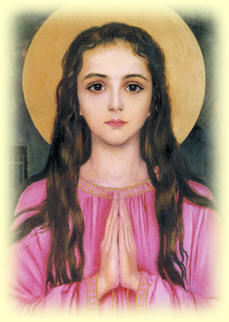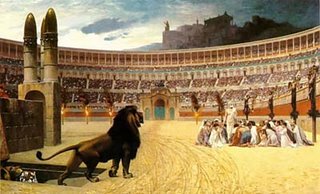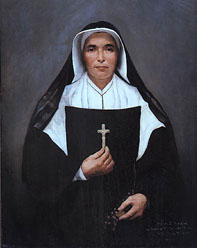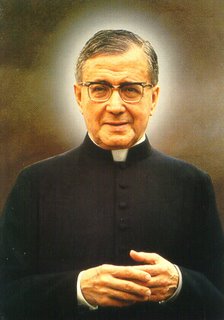
Not much is known about this young girl who's tomb was found in the catacombs of St. Priscilla in Rome. Unfortunately when her remains were found in 1802 by excavators there was no science which could shed light through DNA research about the approximate Era/year of her death.
What is known is that Philomena's tomb contained the body of a young girl of about 13 years of age alongside her remains was found a vial of dried blood. Written on her tomb were the words Lumena/ Paxte/ Cumfe when some experts translated the ambiguous writing they were able to make out the words Pax tecum Filumena which means 'Peace be with you Philomena'.
There were many years of persecution for the young Christian Church at a time when it was dangerous to be a Christian, yet so many of our early Christian martyrs remained loyal to their Faith unto the shedding of their blood. They did not seek to save their own lives at the cost of their beliefs but instead chose to remain firm in their and with great courage they chose to die for their faith rather than live a life of meaningless faithlessness.
One of these great persecutions was that of Nero who as legend says 'fiddled as Rome burned'. There have been many theories as to the origins of the fire some say that Nero himself instructed that a fire be started for his own sick entertainment while others say that the fire was accidentally started in a shop probably a bake house. Who started it is now for history to decide but the consequences were catastrophic for the small Christian community which were living peacefully in Rome.
After the city had been ravaged by fire the Roman citizens were looking for someone to blame and all eyes turned towards Nero who because of his apathy and indifference towards those who had suffered great loss went into damage control. It was Nero who pointed the finger at the Christian community by suggesting that it was them who began the fire. This enraged the Roman citizens who then began the great persecution of the early Christian community. As was reported in the writings of Tertullian, "Nero was the first to rage with Caesar's sword against this sect, "To suppress the rumor." Another writer, Tacitus who was not Christian wrote this concerning the persecution of the Christians by Nero, "Mockery of every sort accompanied their deaths. Covered with the skins of beasts, they were torn by dogs and perished, or were nailed to crosses, or were doomed to the flames and burnt, to serve as a nightly illumination, when daylight had expired.."There arose in the people a sense of pity. For it was felt that they (the Christians) were being sacrificed for one man's brutality rather than to the public interest." Emperor Nero was well known for his depravity towards anyone who displeased him, he would most probably be diagnosed as a psychopath by the physicians of today.
Whether the young Philomena was part of this most terrible persecution by Nero is unknown. What is known is that upon excavating her remains this young girl who had died a martyrs death was placed in the Vatican where she remained for many years.
Then in 1805 a priest who came upon her remains then requested if he could receive the relics of what seemed to be a great Saint of the Church, Don Francesco di Lucia was given this permission. He then enshrined her remains in his village church at Mugnano. It was here that many miracles would soon be attributed to this young martyr of early Rome.
When we examine the courage of the early Christians all must marvel at their great courage and also their tenacity and perseverance in the face of the most terrible tortures. We can only imagine the torture that would have been inflicted on this most holy and pure virgin martyr known as Philomena. In order for her to be remembered on her tomb it is obvious that Philomena came from a more wealthy background and that as she had lived so she died, beloved by those who knew her and had loved her.
Many people began to flock to this shrine of Philomena as many more miracles were attributed to this young saint and martyr, so much so that many were referring to her as 'Philomena, Powerful with God'. So it was that Pope Gregory XVI canonized this most beautiful young girl to Sainthood.
Upon her canonization many priests, nuns and even Popes grew in devotion to her saintly virtues and many more shrines were devoted to this young martyr of the early Church. Some of the better known admirers of Saint Philomena became Saints themselves! Such as St. John Vianney, St. Anthony Mary Claret and St. Madeleine Sophie Barat who I am sure could empathize completely with Philomena's torturous death. There were also many Popes who revered the life of Philomena some of them were Pope Leo XII, Pope Gregory XVI who gave Philomena the title 'Patroness of the Living Rosary, and Pope Pius IX who also proclaimed her as 'Patroness of the Children of Mary' and as the years passed many more Popes proclaimed their devotion to this young girl.
In this day and age of immodesty and narcissism we need to be reminded that such glorious Saints as Philomena once walked this same ground but the difference is they chose the higher path, let us hope to follow their example.

Peace of Christ to ALL
Copyright © 2006 Marie Smith. All rights reserved.

